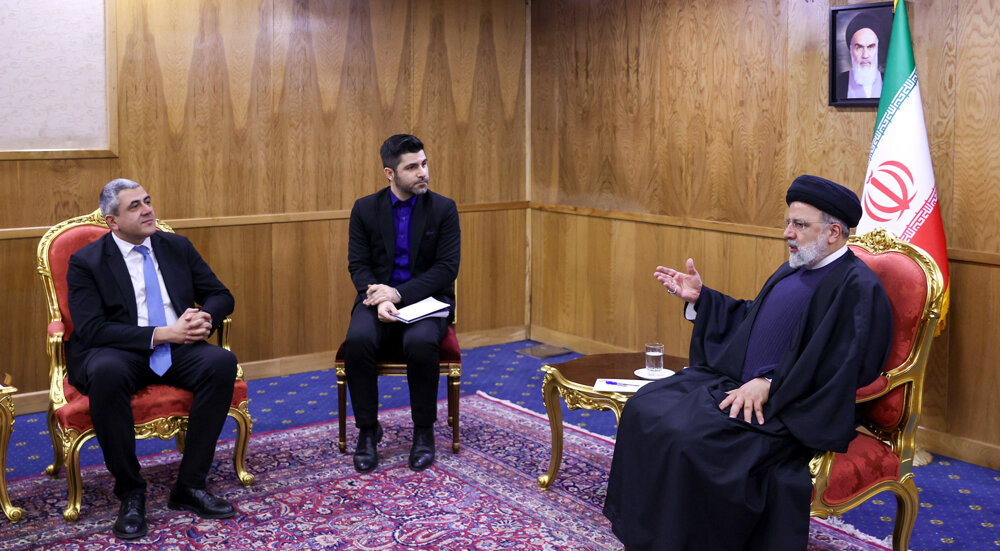UN Tourism secretary-general praises Iran’s efforts, challenges so-called Iranophobia

TEHRAN - UN Tourism Secretary-General Zurab Pololikashvili has recently addressed misconceptions surrounding Iran, commonly known as Iranophbia.
He emphasized that those who propagate Iranophobia are mistaken, adding: “These individuals are attempting to promote a form of propaganda… everyone should see Iran and travel there to understand that what is portrayed in their media is not true, and here is a country with abundant opportunities, history, and traditions.”
Invited to attend the 17th Tehran International Tourism & Related Industries Exhibition, he underscored the importance of tourism for Iran, especially evident through the attendance of Iranian President Ebrahim Raisi at the exhibition’s opening ceremony.
Pololikashvili also met with Raisi who highlighted the significance of promoting the tourism industry, stressing the need for the country’s enhanced interaction with international organizations active in the sector.
“[Obtaining] more knowledge from the World Tourism Organization about Iran and its cultural and civilizational capacities as well as its tourist attractions will play an important role in introducing such capacities to various countries,” Raisi said.
He hailed the positive cooperation between UNWTO and Iran’s Ministry of Tourism and Cultural Heritage and called on Pololikashvili to visit the country’s tourist attractions.
The president further emphasized that some Western countries seek to spread Iranophobia to achieve their own colonial purposes and stressed the need to counter such plots.
The UN Tourism chief, for his part, commended Iran’s efforts to attach importance to the tourism industry and criticized certain Western media for spreading propaganda against the Islamic Republic.
Pololikashvili said he is visiting Iran to introduce the Iranian nation’s rich culture and civilization as well as the country’s historical and tourist attractions to the world. He noted that Iran’s move to cancel visas for dozens of countries would play a very important role in developing the country’s tourism industry, especially health tourism, given its great capacities.
In an evaluation of Iran’s recent efforts towards tourism development regionally and globally, Pololikashvili expressed his honor and pleasure in participating in the significant event.
Pololikashvili also met with the Mayor of Tehran, Alireza Zakani, discussing ways to make the metropolis a more attractive destination both for tourists and investors.
Moreover, Pololikashvili sat with some non-governmental bodies to make clear the role the private sector is playing in advancing shared goals. For instance, he visited the Abbas-Abad recreational center, which consists of some main parks and many different other sections.
Earlier this month, Pololikashvili warmly welcomed Iran’s decision to cancel visas for 33 countries, expressing optimism about a vibrant future for tourism in the ancient country. He expressed hope that the visa waiver policy would usher in a bright and prosperous future for tourism in Iran, the report said.
Last December, the Iranian government agreed to drop visa requirements for passport holders from 32 countries. Moreover, it abolished visa requirements for tourist groups from Russia.
“The government intends to open the country’s doors to the world…. And this decision is both courageous and deliberate by the government,” the tourism minister Ezzatollah Zarghami said.
“The decision helps foil negative advertisements, rumors, and fear-mongering about Iran,” Zarghami said. “The scheme is expected to usher in a new era of tourism development for Iran; a new chapter of prosperity and tourism development that puts an end to negative propaganda and Iranophobia.”
The visa-waiver program was reportedly approved for India, United Arab Emirates, Bahrain, Saudi Arabia, Qatar, Kuwait, Indonesia, Brunei, Japan, Singapore, Cambodia, Malaysia, Vietnam, Brazil, Peru, Cuba, Mexico, Bolivia, Venezuela, Bosnia and Herzegovina, Serbia, Croatia, Belarus, Lebanon, Uzbekistan, Kyrgyzstan, Tajikistan, Tunisia, Mauritania, Tanzania, Zimbabwe, Mauritius, and Seychelles.
Moreover, the Islamic Republic has previously had visited cancelations with some countries like Turkey, the Republic of Azerbaijan, Oman, China, Armenia, Lebanon, and Syria, in various forms - unilateral, bilateral, and group visa cancelations, including airport visas, which were implemented in some cases.
The latest data provided by the tourism ministry suggests the number of foreign arrivals in the country reached 4.4 million during the first eight months of the current Iranian year (started on March 21), which shows 48.5 percent compared to that of last year.
The Islamic Republic expects to reap a bonanza from its numerous tourist spots such as bazaars, museums, mosques, bridges, bathhouses, madrasas, mausoleums, churches, towers, and mansions, of which 27 are inscribed on the UNESCO World Heritage list.
AM
Leave a Comment